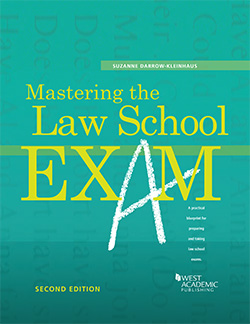- Home
- Mastering the Law School Exam
Mastering the Law School Exam
Mastering the Law School Exam is designed to provide students with a knowledgeable, reasonable, and rational voice to navigate the intricacies of law school exams. This book is practical rather than theoretical where the emphasis is on providing the type of detailed examples necessary to show students precisely “how to do it” and “how to write it.”
By working with numerous illustrations in the context of substantive law, students learn to:
- Fill the gap between what the professor refers to as learning to “think like a lawyer” and the actual means for doing so.
- Create a successful path from note-taking—to outlining—to exam writing.
- Identify the basic skills that exams seek to test and the precise manner in which they are tested.
- Become familiar with the general types of law school exams through examples and detailed analyses of sample answers.
- Use the language of the law in the writing of issues, statements of the rule, and analysis of the facts.
- Draw appropriate inferences from the facts.
- Improve close reading skills as well as writing skills.
- Be pro-active by taking formative assessments in a variety of subject areas and formats.
- Simulate exam conditions by writing exams under timed conditions.
- Target assessments according to identified learning objectives.
- Self-assess by following detailed grading rubrics.
- Use formative assessment to improve learning through identified feedback mechanisms.
- Draw appropriate inferences from the facts.
- Organize their thoughts to write an organized analysis.
- Develop a facility with adapting the “IRAC” structure of legal analysis to answer multiple-choice questions, write essay answers, and address varying performance test tasks.
Imprint: West Academic Publishing
Series: Academic and Career Success Series
Publication Date: 01/18/2023
Suzanne Darrow-Kleinhaus, Touro University Law Center
CasebookPlus™
This title is available in our CasebookPlus format. CasebookPlus provides support beyond your classroom lectures and materials by offering additional digital resources to you and your students. Anchored by faculty-authored formative self-assessments keyed to our most popular casebooks, CasebookPlus allows students to test their understanding of core concepts as they are learning them in class – on their own, outside of the classroom, with no extra work on your part. CasebookPlus combines three important elements:
- A new print or digital casebook
- Access to a downloadable eBook with the ability to highlight and add notes
- 12-month access to a digital Learning Library complete with:
- Chapter questions keyed to the casebook
- Black Letter Law questions (available in select subjects)
- Subject area review questions for end of semester use
Leading digital study aids, an outline starter, and audio lectures in select subjects
Students can still utilize CasebookPlus digital resources if they’ve purchased a used book or are renting their text by purchasing the Learning Library at westacademic.com.
With CasebookPlus, you can customize your students’ learning experience and monitor their performance. The quiz editor allows you to create your own custom quiz set, suppress specific quiz questions or quiz sets, and time-release quiz questions. Additionally, the flexible, customized reporting capability helps you evaluate your students’ understanding of the material and can also help your school demonstrate compliance with the new ABA Assessment and Learning Outcomes standards.
- Revised text throughout the book where appropriate to account for law teaching’s evolution to learning online. This includes what to expect with online classes, Zoom sessions, and taking exams online. A section was added to address the preparation needed to study for and take online classes and exams, including how to prepare your computer and work/study/test area.
- An explanation and description of formative and summative assessments. This includes appropriate references to how learning occurs over time through repetition and reinforcement and how students can use formative assessments during the semester to improve their performance on law school exams.
- A completely revised Chapter 10 on Using Assessments. This Chapter discusses the types of assessments, the role of outcomes and objectives for targeting learning, and implementing the process through a wide variety of assessments in different subject areas, essay styles, and assessment tools.
- Inclusion of a Performance Test to provide an opportunity to develop the organizational, analytical, and writing skills necessary for success in law school and in the practice of law. In addition to the Task, File, and Library, students are given an Evaluation Sheet to self-assess and an example of an “outline-in-progress.” The outline provides step-by-step guidance for organizing and writing the response as the student works through the materials. It is as close to having the professor guide you through the process as one can make it.
Learn more about this series.
Access Denied
Law School Faculty - Sign in or Create an Account to access this content. Law faculty who have created an account can sign in after receiving email notification that registration has been approved. Email accountmanager@westacademic.com or call 800-313-9378 for assistance.
Other Higher Education Faculty who wish to access digital review copies or teaching resources should contact their West Academic Account Manager at college@westacademic.com or 800-360-9378.
Adopters Only
This content is intended for adopters only. Sign in or Create an Account to access this content. Law faculty who have created an account can sign in after receiving email notification that registration has been approved. If you are an adopter who is unable to access this content after signing in, contact your account manager for assistance at accountmanager@westacademic.com or call 800-313-9378 for assistance.
Access Denied
Sign in or Create an Account to access this content. Faculty who have created an account can sign in after receiving email notification that registration has been approved. Contact us for assistance.
Law School Faculty: email accountmanager@westacademic.com or call 800-313-9378.
Other Higher Education Faculty: email college@westacademic.com or 800-360-9378.
Access Denied
Higher education faculty who wish to view this document should contact their West Academic Account Manager at college@westacademic.com or 800-360-9378.
